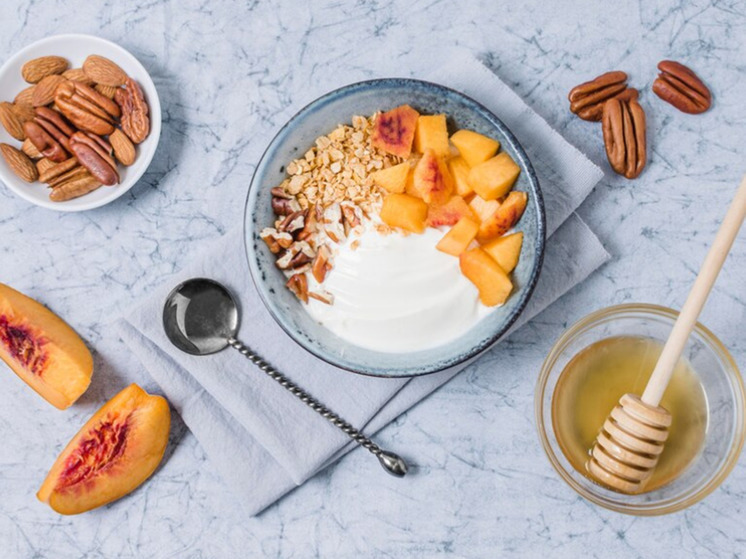Sweetening yogurt with honey may boost its probiotic properties
New research suggests that adding one or two tablespoons of honey to a serving of unsweetened yogurt may boost its probiotic properties by helping the beneficial bacteria in the fermented milk product be better processed in the digestive system.

The nutritionists were interested in the culinary combination of yogurt and honey, which is common in the Mediterranean diet, and how it affects the gastrointestinal microbiome. The results of the study were published in the Journal of Nutrition.
The Mediterranean diet is associated with a number of health benefits, which are generally attributed to the presence of healthy fats in the diet from fish, olive oil and nuts, as well as lower consumption of red meat.
In general, dairy products don't play a big role in the diet, but there are exceptions, namely cheese and yogurt. And dating back at least to the ancient Greek dairy product oxygala, many Mediterranean traditions use honey as a yogurt sweetener.
Based on existing knowledge about yogurt and honey, nutritionist Hannah Holscher and her colleagues wanted to find out whether honey serves more than just a sweetener in this role.
That's because some types of yogurt contain probiotic strains of bacteria, such as Bifidobacterium animalis, which naturally live in the gastrointestinal tracts of many animals and which previous studies have shown to improve gastrointestinal health and immune function in humans.
Honey is known for its antibacterial properties, but it is also a prebiotic — a substance that promotes the growth or activity of beneficial microbes in the human body.
Given its ability to stimulate the growth of beneficial bacteria, the researchers hoped to see if honey could help these bacteria withstand the challenges they face in the human digestive system.
“Enzymes in our mouths, stomachs, and intestines help with digestion and make it easier to absorb nutrients, but they also reduce the viability of microbes,” Holscher explains. “That’s great when it comes to pathogens, but not necessarily beneficial bacteria. We wanted to see if honey could help probiotic bacteria survive in the gut.”
In the first of two new studies, the researchers conducted lab experiments to see how four types of honey — alfalfa, buckwheat, clover and orange blossom — affected the viability of B. animalis in yogurt while simulating the digestion process.
The researchers mixed bacteria-free yogurt with one of the four types of honey, then allowed the bacteria to grow in petri dishes, exposing them to solutions that mimicked one of several fluids they might encounter in our guts: saliva, stomach acid, intestinal bile and enzymes.
The researchers report that none of the four types of honey had a significant effect on the survival of bacteria in saliva or stomach acid, with results similar to those of a control group that received yogurt mixed with sugar or water.
However, in solutions designed to mimic intestinal fluids, yogurt mixed with honey promoted the survival of beneficial bacteria. The effect was most pronounced when clover was used, the study found.
The nutritionists reached their initial findings in a randomized, controlled, crossover study involving 62 healthy adults. They asked respondents to eat two different foods for two weeks: clover honey yogurt for the first two weeks and processed yogurt for the other two weeks.
In a follow-up study, 36 of those participants moved on to a third phase, where they ate yogurt mixed with sugar.
«Our results showed that the combination of honey and yogurt promotes the survival of yogurt probiotic bacteria in the gut, so the results of the laboratory study could be transferred to real-life conditions in humans,» Holscher emphasizes.
The study found no changes in gut transit time, mood, or cognitive function. But that may simply reflect the participants’ overall health, says Hannah Holscher, and is unlikely to rule out the need for further research.
It’s worth noting that honey is still a sugar, which comes with health risks, and the study’s authors aren’t suggesting a Winnie-the-Pooh approach.
“We found that one tablespoon of honey in a serving of yogurt helped support probiotic viability. However, we must remember that honey has added sugar, and most people need to watch the amount of sugar in their diet to maintain a healthy body weight,” Holscher warns.
Despite the many studies pointing to the potential benefits of probiotics, it’s also worth noting that probiotic supplements aren’t right for everyone and may pose risks of their own. Overall, however, Holscher says the study points to hidden wisdom in the ancient tradition of mixing honey and yogurt.
«Adding a little honey to unsweetened yogurt is a great culinary combination to incorporate into your menu,» she concludes.























































Свежие комментарии